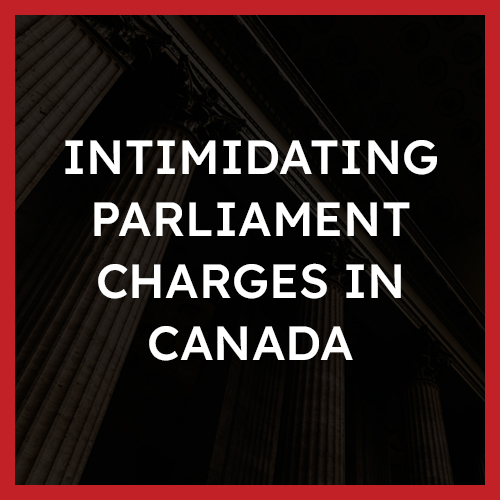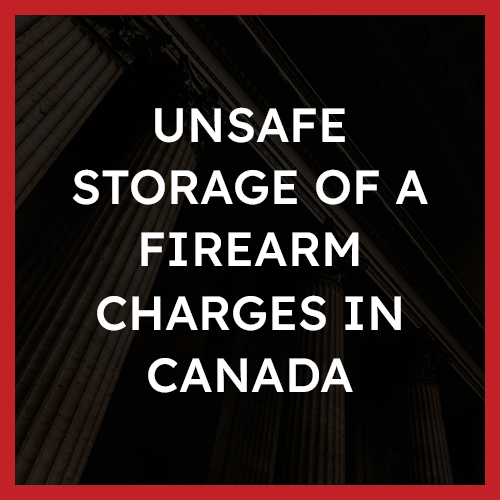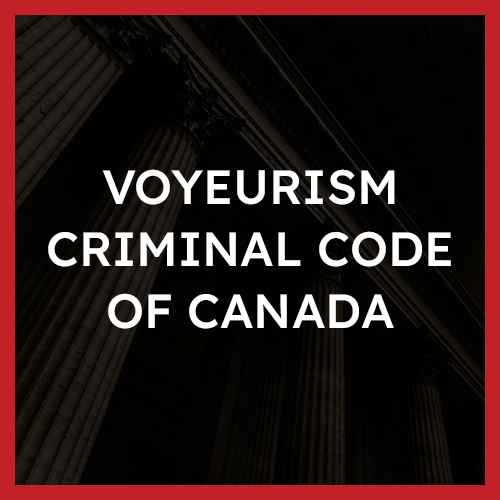Intimidating Parliament Laws in Canada
What is an intimidating parliament charge?

Intimidating parliament is an indictable offence, which means it is a more serious type of criminal charge in Canada, and upon conviction, the perpetrator may face severe consequences, including imprisonment for a period of up to fourteen years.
Examples
Some examples of an intimidating parliament charge may include the following:
- Making bomb threats in or around parliamentary buildings or legislative assemblies;
- Unlawfully entering the premises of Parliament or a provincial legislature with weapons;
- Engaging in violent demonstrations or riots aimed at coercing legislative bodies to change their decisions or policies; and
- Vandalizing or causing substantial damage to government buildings, vehicles, or infrastructure.
Defences
The defences available to an intimidating parliament charge are entirely dependent on the facts of your case.
However, some defences may include:
- The accused was wrongly identified as the person who committed the violent act to intimidate parliament or a provincial legislature;
- The accused did not intend to intimidate parliament or the legislature; and
- The accused acted under duress.
Punishment
An intimidating parliament charge is an indictable offence, which entails a maximum punishment as follows:
- Imprisonment for a term not exceeding 14 years.
In cases of the intimidating parliament charge, it’s important to understand the potential consequences. The maximum punishment for this offence is a substantial term of imprisonment, not exceeding 14 years, which underscores the seriousness with which the legal system views any attempt to intimidate parliament or a legislature. However, there are no mandatory minimum penalties for this offence which allows the courts some flexibility to consider the unique circumstances of each case. It is important to note that if convicted of an intimidating parliament charge, the conviction can entail severe consequences for current and future employment opportunities and immigration status.
Overview of the Offence
According to s. 51 of the Criminal Code:
Intimidating Parliament or Legislature
51 Every one who does an act of violence in order to intimidate Parliament or the legislature of a province is guilty of an indictable offence and liable to imprisonment for a term not exceeding fourteen years.
According to s. 55 of the Criminal Code:
Evidence of Overt Acts
In proceedings for an offence against any provision in section 47 or sections 50 to 53, evidence of an overt act is not admissible unless that overt act is set out in the indictment or unless the evidence is otherwise relevant as tending to prove an overt act that is set out in the indictment.
The Guilty Act (Actus Reus)
The actus reus for an intimidating parliament charge under s. 51 is established by proof, beyond a reasonable doubt, of the following:
In cases of an intimidating parliament or a provincial legislature charge, the Crown must establish beyond a reasonable doubt that the accused engaged in an act of violence, threat, or intimidation intended to disrupt or create fear within these legislative bodies. The Crown must prove that the accused’s actions were more than just a political expression or a lawful exercise of rights, but rather, they were deliberate and intended to intimidate.
The Guilty Mind (Mens Rea)
The mens rea for an intimidating parliament charge under s. 51 include proving, beyond a reasonable doubt, that:
To secure a conviction for intimidating parliament or a provincial legislature, the Crown must establish beyond a reasonable doubt that the accused possessed the requisite mental element to commit the offence. In this case, the mens rea involved proving that the accused had a specific intent to intimidate or create fear within the legislative bodies. It’s not enough for the accused to have engaged in the alleged acts; there must be clear evidence demonstrating that they acted with the deliberate purpose of intimidating or disrupting the functioning of these democratic institutions.
Defences
How to Beat an Intimidating Parliament Charge
Every case is different. The availability and strength of any defence depend entirely on the specific facts of your case. The strength of any available defence rests on the evidence against you and the precise details of the allegations. However, the following are some common defences that may be used when fighting an intimidating parliament charge:
Factual innocence
A strong defence against an intimidating parliament charge is to maintain that you are factually innocent. If you can show that the facts and the evidence do not support that you committed a violent act with the intent to intimidate parliament or a provincial legislature, then you may have a defence that you were factually innocent.
Lack of Intent
Lacking the intent to intimidate Parliament or a provincial legislature can be a significant defence in cases involving the charge of intimidating these democratic institutions. To secure a conviction, the Crown must demonstrate beyond a reasonable doubt that the accused had a specific intent to create fear or disruption within these legislative bodies. If the accused can provide evidence or arguments showing that their actions were not intended to intimidate but rather were part of a peaceful protest, legitimate political expression, or some other lawful activity, it can serve as a strong defence.
Identity
Depending on the circumstances of your case, a possible defence to an intimidating parliament charge may be to raise an identity defence. In this case, for this defence to be raised successfully, you will have to prove that you were not the person who was intimidating parliament or a provincial legislature.
Any applicable Charter defences
The Charter sets out your rights and freedoms before and after your arrest. If the police fail to abide by these rights deliberately or inadvertently, it could aid in your defence. If any of your Charter rights have been violated before or after your arrest, you may be able to have some or all of the evidence that the Crown is relying on to secure a conviction excluded under s. 24(2) of the Charter.
Punishments
The Criminal Code provides for a possible maximum term of imprisonment of no more than 14 years for those convicted of an intimidating parliament charge.
Upon conviction of the charge of intimidating Parliament or a provincial legislature, the sentencing provisions in Canada can vary depending on several factors, including the specific circumstances of the case. The maximum punishment for this offence is imprisonment for a term not exceeding fourteen years. However, the actual sentence imposed can be influenced by various factors, such as the severity of the act, the accused’s prior criminal history, any aggravating or mitigating factors, and the judge’s discretion. In some cases, individuals may receive a prison sentence, while in others, the court may opt for a combination of penalties, such as fines, probation, or community service, based on the principles of proportionality and rehabilitation. It is crucial to consult with legal counsel to understand the potential sentencing options and their specific application to your case, as they can significantly impact the outcome following a conviction.
Frequently Asked Questions
What is considered intimidation in Canada?
In Canada, intimidation typically refers to actions or behaviour intended to create fear, apprehension, or coercion in others. While the concept of intimidation is broad and can encompass various forms of conduct, it often involves actions that threaten harm, use force, or employ tactics to influence or manipulate individuals or groups. What is considered intimidation in Canada can encompass a wide range of behaviours, from making threats, engaging in harassment, stalking, or violent actions, to attempting to control, manipulate, or instill fear in someone. The context and intent behind these actions are crucial in determining whether they meet the legal definition of intimidation, which may vary depending on the specific provisions of the Criminal Code.
Can you go to jail for making threats against a member of parliament?
Making threats against a Member of Parliament (MP) in Canada can potentially lead to criminal charges and, upon conviction, result in a jail sentence. It’s crucial to understand that threats against MPs or any individuals are taken seriously, and engaging in such behaviour can have significant legal consequences.
What is the punishment for Intimidating Parliament in Canada?
The punishment for intimidating Parliament in Canada is outlined in Section 51 of the Criminal Code. Conviction of this offence carries a maximum penalty of imprisonment for a term not exceeding fourteen years. While this maximum penalty is substantial, it’s essential to note that there are no mandatory minimum penalties for this offence. The actual punishment imposed can depend on various factors, including the specific circumstances of the case, the defendant’s intent, and the judge’s discretion. The severity of the act, any mitigating or aggravating factors, and the defendant’s criminal history can all influence the sentencing decision.
Articles & Resources
Egan: 1989 Hill hijacker won pardon, legal obtained 17 more guns
In 1989 a man named Charles Yacoub hijacked a Greyhound bus and brought it onto Parliament Hill. The incident resulted in a six-hour-long standoff on the lawn of Parliament Hill. Yacoub was charged with hostage-taking, intimidating Parliament, and aggravated assault. However, he was acquitted of those charges. Yacoub was convicted of forcible confinement and use of a weapon in commandeering the bus. The acquittal of the more serious charges has been questioned and discussed. Yacoub’s case is one of the only instances of someone being charged under section 51 in Canada.
You can read the full article here.
Toronto 18: Key events in the case
The events of the summer of 2006, known as the Toronto 18 case, involved a significant anti-terrorism sweep in southern Ontario. The arrests, totaling 18 individuals, revealed a complex situation with two distinct plots. One plan aimed at bombing the Toronto Stock Exchange and other prominent buildings, while the other involved an attempt to establish a large al-Qaeda-type cell in Toronto. The latter plot intended to arm the individuals with weapons and create mayhem to instill fear in the Canadian public, ultimately pressuring the government to withdraw troops from Afghanistan. While this case primarily focused on terrorism-related charges, some may perceive the second plot as an attempt to influence governmental decisions through intimidation, potentially involving elements that could be considered intimidating Parliament or the legislature. However, it is essential to note that legal interpretations may vary, and any assertions of intimidation would depend on the specific evidence and charges brought forth in the legal proceedings.
You can read the full article here.
Contact Us
If you have been charged with a criminal offence, visit our location pages to contact our team.
About The Author
Ask A Question
We endeavor to respond to questions within 24 hours. If your matter is urgent, please call our office or submit a request for a free consultation.







